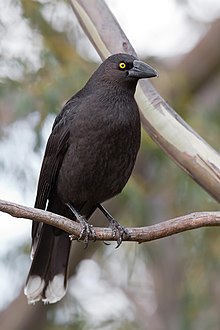| Black currawong | ||||
|---|---|---|---|---|

| ||||
| Black currawong, Tasmania | ||||
| Scientific classification | ||||
| Domain: | Eukaryota | |||
| Kingdom: | Animalia | |||
| Phylum: | Chordata | |||
| Class: | Aves | |||
| Order: | Passeriformes | |||
| Family: | Artamidae | |||
| Subfamily: | Cracticinae | |||
| Genus: | Strepera | |||
| Species: | S. fuliginosa
| |||
| Binomial name | ||||
| Strepera fuliginosa (Gould, 1837)
| ||||

| ||||
| Black currawong range subspecies indicated
| ||||
The black currawong (Strepera fuliginosa), also known locally as the black jay, is a large passerine bird endemic to Tasmania and the nearby islands within the Bass Strait.[2] One of three currawong species in the genus Strepera, it is closely related to the butcherbirds and Australian magpie within the family Artamidae. It is a large crow-like bird, around 50 cm (20 in) long on average, with yellow irises, a heavy bill, and black plumage with white wing patches. The male and female are similar in appearance. Three subspecies are recognised, one of which, Strepera fuliginosa colei of King Island, is vulnerable to extinction.
Within its range, the black currawong is generally sedentary, although populations at higher altitudes relocate to lower areas during the cooler months. The habitat includes densely forested areas as well as alpine heathland. It is rare below altitudes of 200 m (660 ft). Omnivorous, its diet includes a variety of berries, invertebrates, and small vertebrates. Less arboreal than the pied currawong, the black currawong spends more time foraging on the ground. It roosts and breeds in trees.
- ^ BirdLife International (2016). "Strepera fuliginosa". IUCN Red List of Threatened Species. 2016: e.T22706296A94061073. doi:10.2305/IUCN.UK.2016-3.RLTS.T22706296A94061073.en. Retrieved 19 November 2021.
- ^ "Black Currawong". Australian Museum. Archived from the original on 23 September 2009. Retrieved 27 July 2009.
